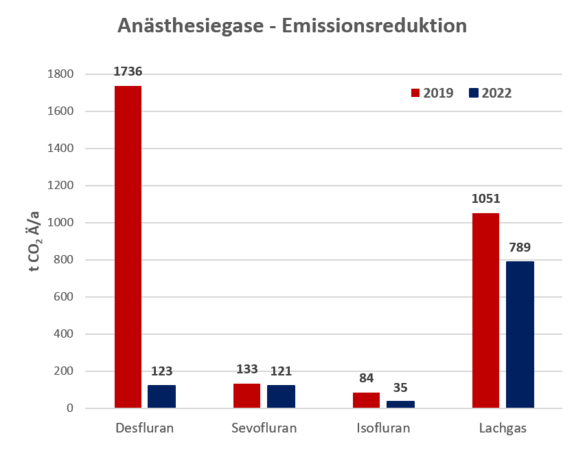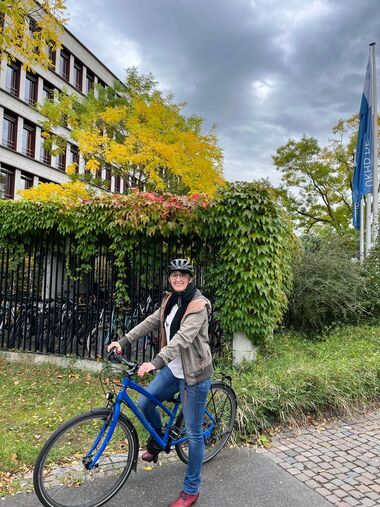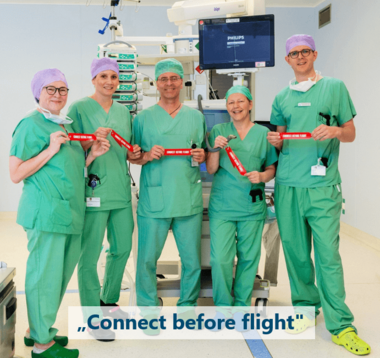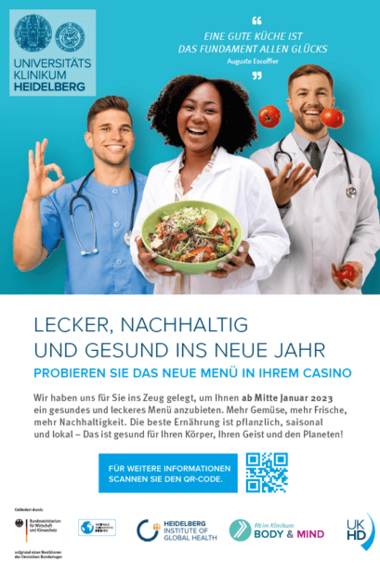Fields of action
The fields of action in the area of sustainability and climate protection are diverse. From mobility to energy (electricity, heat), food supply, buildings (construction, refurbishment, operation), procurement, IT, disposal and adaptation measures to the intensifying consequences of the climate crisis such as heat and extreme weather.
Below are a few examples of sustainability and climate protection measures that we have already implemented or are currently implementing:
NARKOSEGAS

... are greenhouse gases that have a much higher global warming potential thanCO2. The most climate-damaging anaesthetic gas - desflurane - is therefore no longer used at the UKHD. The amount of other anaesthetic gases used has also been greatly reduced without negatively affecting the supply. Thanks to the pharmacy and the Department of Anaesthesiology, the UKHD avoids almost 2,000 tonnes of greenhouse gas equivalents per year.
In addition, the centralised supply of nitrous oxide was discontinued in March 2023, leading to further savings.
Sustainable mobility is health protection

More exercise in everyday life through cycling and walking reduces the risk of cardiovascular disease. E-buses and e-cars improve air quality and reduce noise pollution.
To protect the climate, environment and health
- we are gradually electrifying the UKHD vehicle fleet (current status: 22%)
- promote local public transport by subsidising the German job ticket
- expand the bicycle parking facilities
Since May 2024, UKHD employees have also been able to use the BUSINESSbike from VRNnextbike free of charge for 60 minutes per journey.
From autumn 2024, employees and patients will be able to charge their electric car at one of the 6 charging points in the UKHD car parks. A further 250 are planned.
Energy from renewables & saving

On the way to becoming a climate-neutral hospital, UKHD is also implementing measures in the areas of electricity, heating and cooling. This includes strategies to save energy and generate it in a more environmentally friendly way. The energy department at Klinik Technik GmbH is therefore gradually switching to LED lighting at UKHD and installing photovoltaic systems on the roofs of the medical clinic, the pharmacy and the central laboratory.
More on this in the UKHD annual report 2022
Electricity is also saved in the operating theatre: the anaesthesia department decouples the anaesthetic gas suction after the last operation. This means that no compressed air is used, thus reducing electricity consumption.
A hospital not only needs heat for heating, but also steam for sterilising surgical instruments (among other things). In order to generate heat and steam in a climate-neutral way, the district heating supply in Neuenheimer Feld needs to be converted. Our experts are working intensively with the state authorities and the city of Heidelberg on aconcept for the future supply of renewable energy.
FOOD SUPPLY - sustainable, healthy and delicious

Approximately 30 % of greenhouse gas emissions worldwide are caused by food. The German Nutrition Society recommends eating a maximum of 150g of meat twice a week. A plant-based diet protects the environment and the climate and is healthy at the same time.
A pilot project by the Heidelberg Institute for Global Health (HIGH) has shown that up to 49% of GHG emissions from the food supply can be avoided by switching to a plant-based menu line at the UKHD.
Following the successful completion of the project, expansion and continuation were planned and since 15 January 2024 there has only been one menu line with meat/fish and two vegetarian lines for employees and patients at the entire hospital. A vegan dish is also offered at least twice a week.
You can find the delicious vegetarian and vegan recipes from the pilot study here:
biodiversity
To promote biodiversity, the KTG outdoor facilities department is creating a flower meadow with native flowering plants to the east of the medical clinic. This has many advantages over ordinary grass areas.
Flowering meadows
- provide a rich supply of nectar and pollen for bees, wild bees, bumblebees and butterflies. This not only pleases insects, but also birds and hedgehogs, whose food source is insects.
- have a lower water requirement and are therefore more resistant to longer periods of drought
- only need to be mown twice a year.
We would also like to take this opportunity to thank the Biodiversity Working Group of the Sustainability Network (NeNa), which initiated and supports the project.
Metered dose inhalers vs. powder inhalers
Lung diseases such as bronchial asthma or COPD (chronic obstructive pulmonary disease) are often treated with inhaled medication. Some of these inhaled preparations are administered using gas-powered inhalers (metered dose inhalers). The propellant gases they contain (hydrofluoroalkanes) have a high global warming potential.
The current data situation indicates that the proportion of metered dose inhalers can be reduced in favour of dry powder inhalers without disadvantages for patients.
In order to achieve climate-sensitive prescribing of inhalers, the UKHD's medicine house list was adapted as part of the KliOL project so that there is a climate-friendly alternative (dry powder inhalers) for all active ingredients. In addition, the ordering processes in the UKHD pharmacy were set up so that for some preparations, the climate-damaging metered dose inhaler can only be ordered on request. A short training event was organised to train the staff of the Clinic for Cardiology, Angiology and Pulmonology and the Thorax Clinic.
![[Translate to English:] Gardener spreads soil in a green strip to the east of the medical clinic to create a flower meadow. In the background, flowering cherry trees in front of the medical clinic.](/fileadmin/_processed_/7/d/csm_IMG_1156_4cb13572e5.jpg)